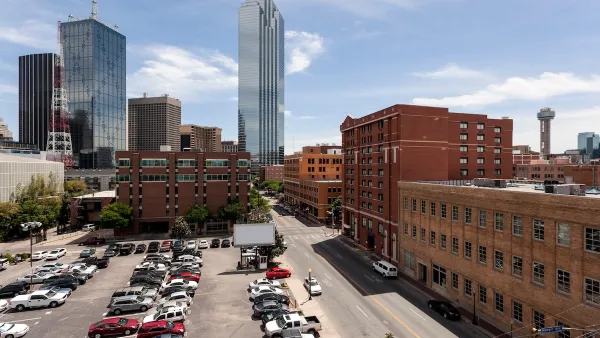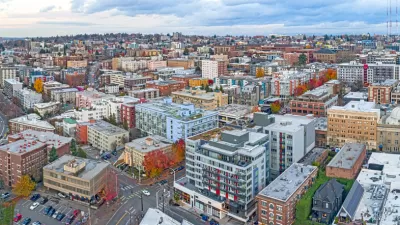In Washington state, onerous parking requirements are a major factor in a growing childcare shortage.

Minimum parking requirements are having a new, unexpected negative impact: limiting access to childcare.
As Catie Gould explains in an article for Sightline, parking requirements across the Cascadia region of the Pacific Northwest are making it “difficult or impossible to permit new daycares if the sites are unable to meet that arbitrary asphalt standard,” worsening an existing childcare shortage.
In Clark County, for example, there are three or more children under five for each slot available at a licensed childcare provider. According to Gould, “Sixty-three percent of Washington families live in a childcare desert, the sixth worst in the United States. The lack of access was estimated to cost $6.9 billion to Washington’s economy in 2023.”
Between state requirements of at least 75 square feet of outdoor play space per child and an average of 87 square feet of parking per child, Sightline estimates that a childcare center wanting to serve 50 children would need 8,100 square feet of outdoor space. “There simply aren’t many land parcels in Washington cities that have that surplus of space.”
According to Gould, cities that have reformed their parking regulations have seen a rise in new daycare openings. “Removing parking mandates won’t remove every obstacle to new childcare services, but it’s a no-cost solution that can make an immediate difference for families across Cascadia.”
FULL STORY: Parking Mandates Are Keeping Kids Out of Daycare

Planetizen Federal Action Tracker
A weekly monitor of how Trump’s orders and actions are impacting planners and planning in America.

Restaurant Patios Were a Pandemic Win — Why Were They so Hard to Keep?
Social distancing requirements and changes in travel patterns prompted cities to pilot new uses for street and sidewalk space. Then it got complicated.

Map: Where Senate Republicans Want to Sell Your Public Lands
For public land advocates, the Senate Republicans’ proposal to sell millions of acres of public land in the West is “the biggest fight of their careers.”

Maui's Vacation Rental Debate Turns Ugly
Verbal attacks, misinformation campaigns and fistfights plague a high-stakes debate to convert thousands of vacation rentals into long-term housing.

San Francisco Suspends Traffic Calming Amidst Record Deaths
Citing “a challenging fiscal landscape,” the city will cease the program on the heels of 42 traffic deaths, including 24 pedestrians.

California Homeless Arrests, Citations Spike After Ruling
An investigation reveals that anti-homeless actions increased up to 500% after Grants Pass v. Johnson — even in cities claiming no policy change.
Urban Design for Planners 1: Software Tools
This six-course series explores essential urban design concepts using open source software and equips planners with the tools they need to participate fully in the urban design process.
Planning for Universal Design
Learn the tools for implementing Universal Design in planning regulations.
Heyer Gruel & Associates PA
JM Goldson LLC
Custer County Colorado
City of Camden Redevelopment Agency
City of Astoria
Transportation Research & Education Center (TREC) at Portland State University
Camden Redevelopment Agency
City of Claremont
Municipality of Princeton (NJ)





























